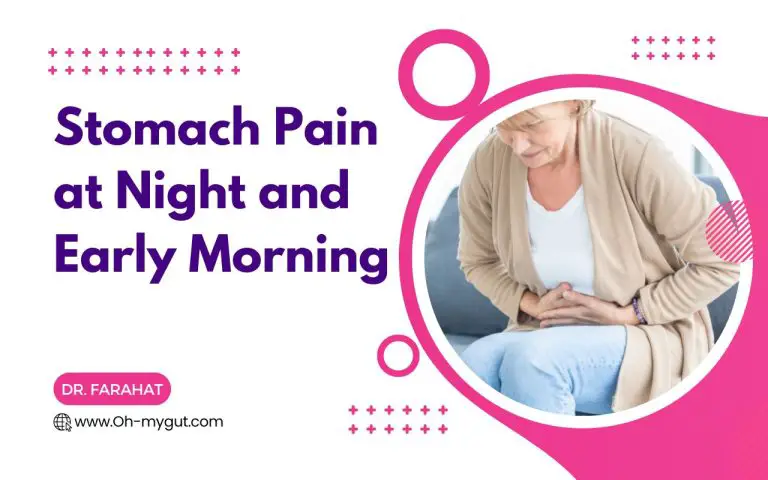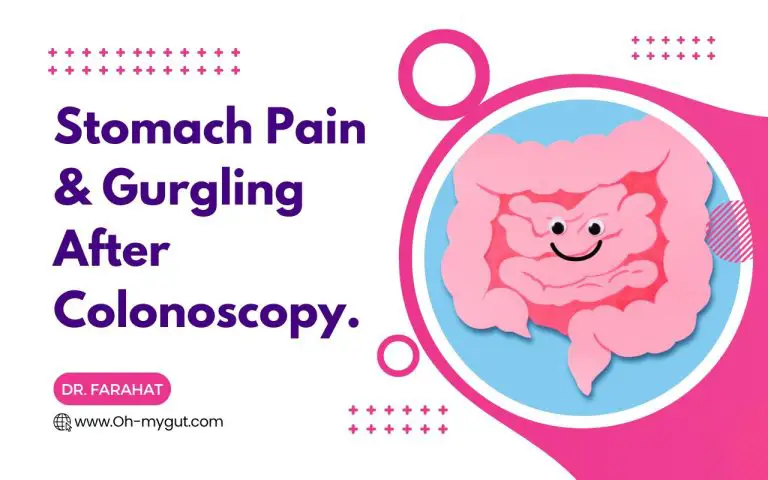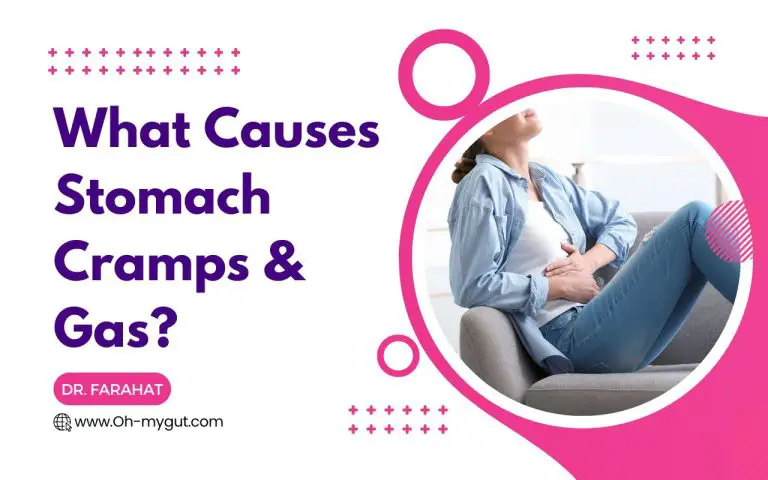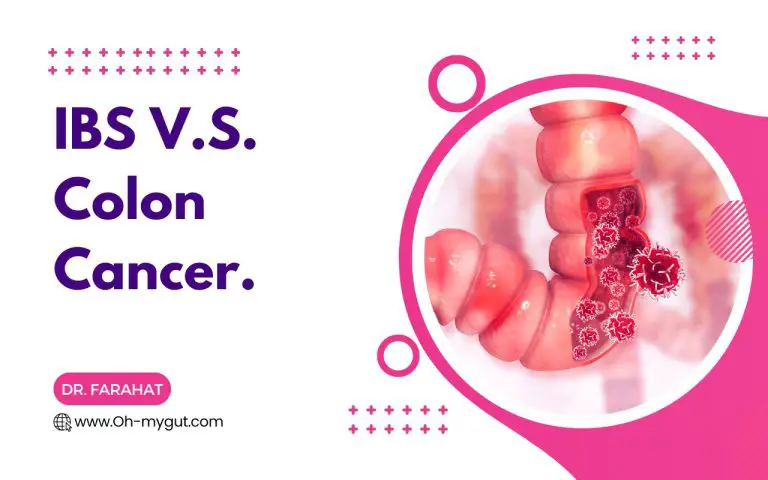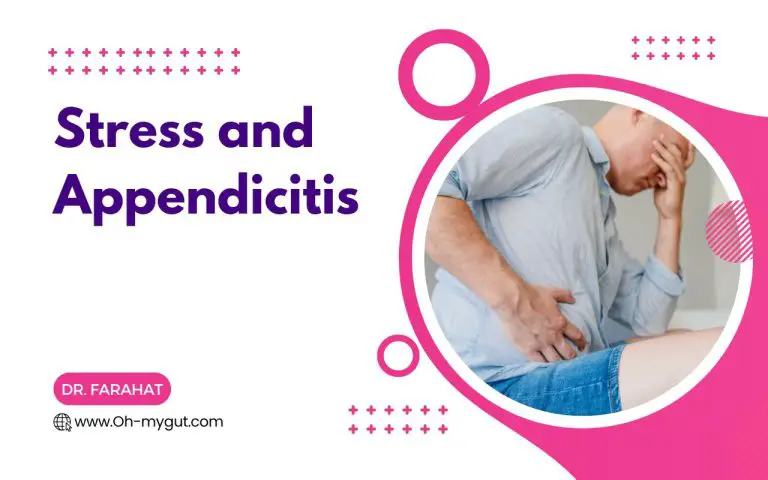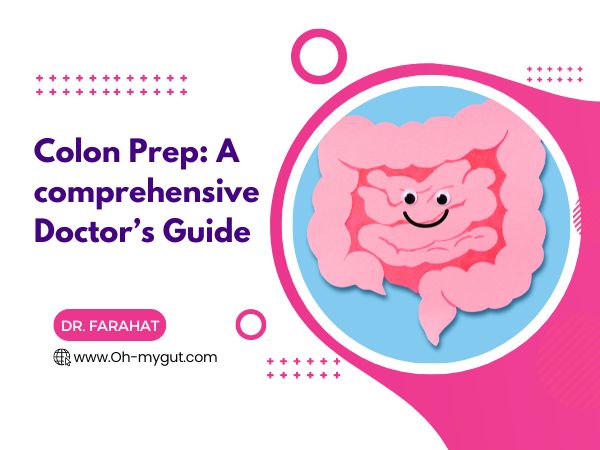Stomach Gurgling & Pain After Colonoscopy: 7 Causes & Treatments.
Our content is not intended nor recommended as a substitute for medical advice by your doctor. Use for informational purposes only.
Quick Insights:
Up to 20% of people can experience stomach pain and gurgling noises after a colonoscopy. The most common cause is trapped gas from the colonoscopy procedure. Other common causes include anesthetic medications, side effects of the colonoscopy preparation, and eating heavy meals afterward. The most common risk factors for pain and bloating after a colonoscopy are the longer duration of the colonoscopy and being a female.
Causes of stomach gurgling and pain after colonoscopy include:
- Trapped gas.
- Longer duration of the procedure.
- Some procedures during colonoscopy include Cutting off a polyp or taking a biopsy.
- Colon preparation process (high-dose laxatives).
- Being a female.
- Suffering from irritable Bowel Syndrome can Contribute to stomach pain after a colonoscopy.
- Rarely, stomach pain can occur due to serious complications such as perforation or post-polypectomy coagulation syndrome.
Red flags of post-colonoscopy pain:
- Severe pain or tenderness over your belly.
- Fever.
- Vomiting.
- Passage of a large amount of reddish or blackish stool.
To prevent & cure post.colonoscopy stomach pain:
- Try to move or do a light exercise.
- Eat bland foods and avoid high-fat and fried foods.
- Use over-the-counter anti-gas medications such as simethicone.
- Probiotics seem to help in the short and the long term.
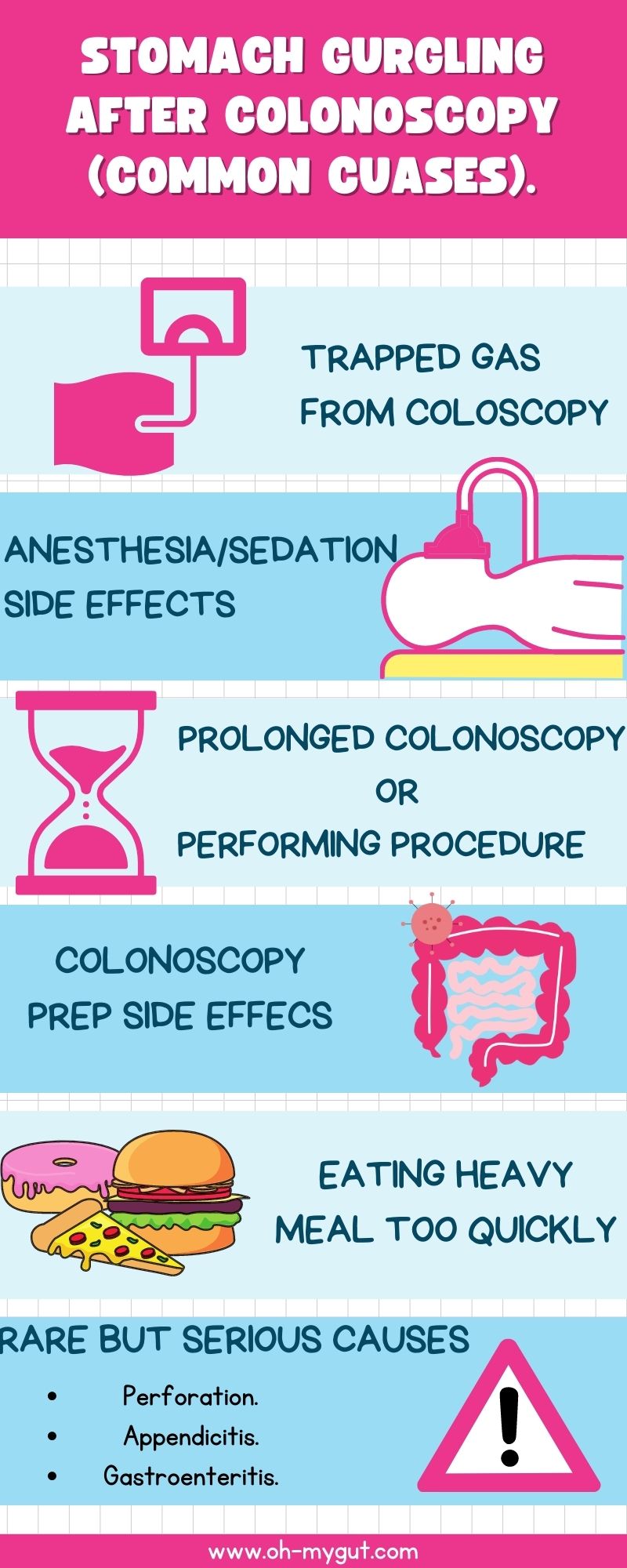
Stomach pain and gurgling for one or two days after colonoscopy:
It is normal to have stomach pain and gurgling for The following one or two days after your colonoscopy. Studies show that up to 20% of patients like you complain of some pain or discomfort (reference).
Many factors may contribute to the pain you may feel directly after your colonoscopy: –
- Trapped Gas: Your doctor uses air to inflate your colon, which may cause distension, pain, and gurgling after a colonoscopy. Typically, trapped gas after colonoscopy is the most common and most benign cause of stomach gurgling or rumbling after colonoscopy.
- Sedation medications: can cause some nausea and abdominal discomfort. Anesthetic and sedating medications during the procedure slow down the motility of your intestine, leading to digestive issues such as pain, nausea, stomach growling, or gurgling after the colonoscopy.
- Some procedures during colonoscopy include removing a polyp or taking a Biopsy.
- If your doctor takes a long time performing the colonoscopy, you are more likely to develop pain, bloating, and gurgling (due to prolonged manipulations of the colon).
- The colon preparation process before the colonoscopy with strong laxatives in large doses may affect the balance of microbes and digestion for many days.
- Eating heavy meals too quickly after colonoscopy: eating heavy meals such as fatty meals, fast foods such as burgers or pizza) shortly after colonoscopy can cause stomach gurgling, nausea, pain, or diarrhea after colonoscopy. Start with bland and easy-to-digest foods.
- Rarely, complications such As perforation or post-colonoscopy appendicitis, but these conditions are extremely rare. I’ve written a detailed article about signs of colon perforation after a colonoscopy.
Trapped gas is the most important cause of stomach pain, Bloating, and gurgling in the first 1-2 days after colonoscopy.
One study showed the frequency of minor complications in the first week after a colonoscopy (reference).
- Bloating: is the most frequent condition (25 %)
- Stomach pain: 10.9 %.
- Diarrhea: 6.3 %.
- Nausea: 4%.
- Minor Blood in stool: 3.8%.
- Constipation: 1.9 %
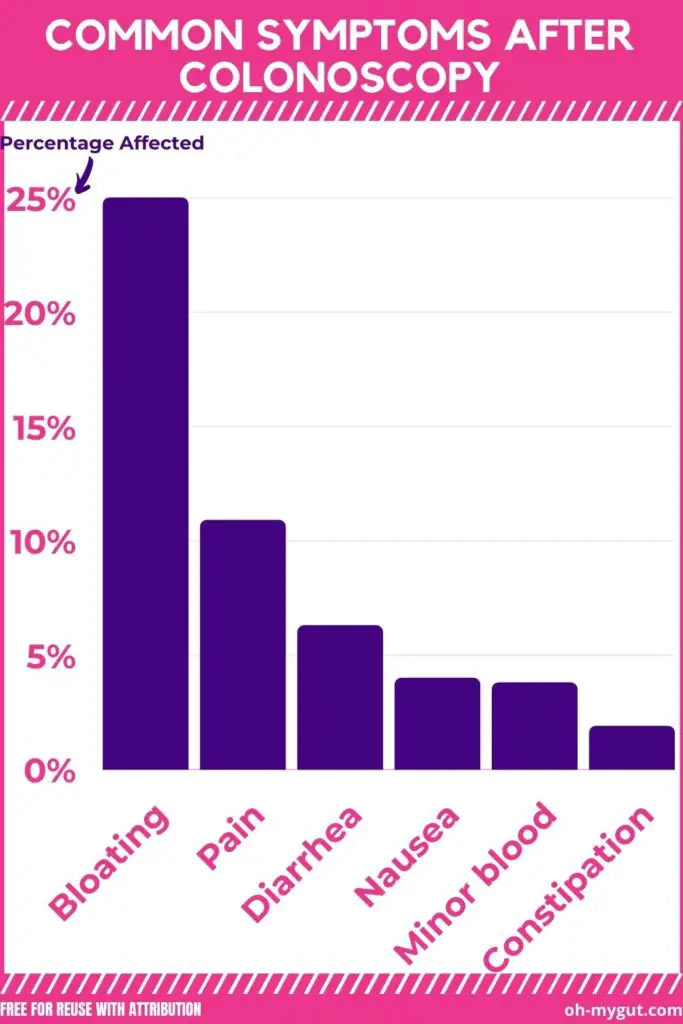
Also, some other factors can contribute to stomach pain.
These factors are not related to the colonoscopy itself, But related to the patient himself!
For Example: –
– If you’re a female: females are more likely to experience pain after colonoscopy (reference).
– If you are an irritable bowel syndrome sufferer.
Stomach pain & gurgling after colonoscopy for longer periods (A week or more).
Sometimes, you may continue to feel pain or bloating for a relatively long period.
According to this study, the two most common factors related a prolonged pain and gurgling after colonoscopy are:
1- longer duration of The procedure: if your doctor took more time performing the colonoscopy.
2- female gender: Women feel stomach pain longer than males.
Also, Another study proposed that prolonged stomach pain, bloating, or gurgling may occur by a different mechanism. They theorized that colon preparation washes out the beneficial bacteria inside your intestine and colon.
Administration of probiotics (to regain the normal microbes) effectively decreased the number of days of pain (From approximately three to only two days; That’s a 30% or more improvement).
Rare but serious causes of gurgling and pain after colonoscopy:
As we mentioned before, colonoscopy is generally a safe procedure. And the incidence of major complications is extremely low (reference).
For example:
1. perforation: if your doctor pushes too hard against the wall of your colon, this may lead to a small tear in its wall. See our full article about symptoms and signs of colon perforation after colonoscopy.
2. post polypectomy Electrocoagulation syndrome: if your doctor cuts off a colon polyp, he’ll use a tool with electrical current to seal the area. Sometimes, too much electrical current can cause some burning and inflammation in the wall of your colon (reference)
3. Infection; a colonoscope can be hard to be cleaned. So, a small percentage of people may have GI infection (gastroenteritis) after colonoscopy leading to diarrhea, stomach cramps, and gurgling. Common microbes are E. coli, Klebsiella, or Enterobacter.
Besides abdominal pain, you may experience diarrhea or fever.
4. post-colonoscopy appendicitis, another extremely rare condition, only 53 cases are reported in this review study (reference). Patients present with severe Rt lower abdominal pain after colonoscopy.
When to call your doctor for stomach pain.
After a colonoscopy, feeling stomach pain, gurgling, or bloating for a day or two is OK.
The pain is usually tolerable, doesn’t interfere with your daily activities, and is often associated with a sense of distension, bloating, or gurgling.
But if you experience any of the below “red flags,” ask for medical help from your doctor:
- Severe pain or cramping in your belly
- Tenderness or hardness in your stomach (to the degree that you ca unable touch it).
- Vomiting, especially if more than once.
- Fever.
- Frequent or severe diarrhea that is not going away.
- No bowel movements for more than 5 to 7 days.
- Bloody bowel movements (one or two minor bleeds after colonoscopy are considered OK).
- Dizziness or severe shortness of Breath.
- Passage of blackish stools (large amount).
Tips to avoid or decrease stomach pain & gurgling after colonoscopy.
1- Move.
Trapped gas after a colonoscopy is the most common cause of pain. The single best way to overcome stomach gas is to move. Walking or moving around helps your colon to pass extra gas.
2- Eat.
Eating bland foods such as rice is allowed after a colonoscopy unless your doctor advises against it. But some foods may contribute to The stomach pain you feel after a colonoscopy.
DO NOT eat :
- Fried foods.
- Fast food like pizza.
- High-fat food.
- Spicy foods.
- Gas-producing foods such as Beans.
- Soda and carbonated beverages.
DO eat: soft, easy-to-digest foods such as:
- Mashed potatoes
- soup
- Tender, cooked vegetables.
- Yogurt.
- Scrambled eggs.
- Jell-O.
- Popsicles.
- Pudding.
3- Drink.
Colon prep. can cause dehydration. And this is particularly common if you are older or have had vomiting.
Drinking water, fruit juice, or vegetable juice can help your stomach pain & gurgling.
Rehydration helps your digestive system to regain its normal function.
Another option is to drink peppermint tea. Peppermint is known for its antispasmodic effects.
Also, chamomile tea can help reduce trapped gas, bloating, and stomach pain.
4- Avoid:
- Eating too fast or too much.
- Chewing gum.
- smoking
- Alcohols.
5- Simethicone.
Simethicone is an over-the-counter medication that can help you expel excess gas after a colonoscopy.
It’s available under many names (For example, Gas-x). Follow instructions and dosing, and discuss the issue with your doctor.
6- Try a probiotic.
As we explained, Some studies suggest that stomach pain and bloating after colonoscopy are due to colon prep.
As colon prep. washes out the good bacteria inside your colon, A probiotic will help you to regain your normal colon microbe balance.
A probiotic containing Lactobacillus acidophilus NCFM & Bifidobacterium Lactis Bi-07 successfully decreases post-colonoscopy pain (reference).
MORE: What Causes general ill feeling after colonoscopy?
Bonus: What causes Stomach Gurgling after colonoscopy Prep? (before colonoscopy)?
Stomach gurgling and noises may also occur before colonoscopy. You may experience such gurgling and pain during and after taking the colonoscopy preps such as Moviprep, or Miralax is a common and benign side effect.
The stomach rumbling noise is due to the high dose laxative that induces bowel movements to evacuate the colon. No Need to worry about stomach noise unless you have other symptoms such as intense vomiting, severe intolerable abdominal pain, or bloody diarrhea.
Stay hydrated and walk around (or perform any light physical activity). This will help your stomach to get better much faster. No need to discontinue the colonoscopy prep unless you have other side effects.
FAQs:
How long does your stomach rumble after a colonoscopy?
Stomach rumbling after a colonoscopy? It’s normal and usually calms down within a few hours or days. Everyone’s different, though, so if your tummy’s still making a racket after a few days, it might be a good idea to shout your doctor.
What causes Excess gas for weeks after colonoscopy?
Feeling a bit gassy after your colonoscopy? That’s because they pump some air into your colon during the procedure. Plus, the bowel prep can shake up your gut flora a bit, and getting back to eating normally can also create some extra gas. If you’re still feeling like a balloon weeks after the procedure, it’s time to check in with your doctor.
Can You take Gas-X after a colonoscopy?
Got gas after your colonoscopy and thinking about taking Gas-X? Generally, it’s OK to use over-the-counter gas relief meds like Gas-X. But remember, it’s always smart to check with your doctor or pharmacist before popping any new pills.
Why is my stomach growing after a colonoscopy?
If your stomach’s growling like a bear after your colonoscopy, it’s usually because your digestive system’s returning to business. It can also be due to gas moving around in there. Try eating slowly, having smaller meals more often, and steering clear of foods that make you gassy. But hey, if that growling comes with pain, vomiting, or fever, don’t mess around – get medical help.
- Evidence-based
- Written by a doctor.

